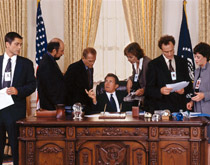
It’s twilight on a typical seductive May evening in the City of Dreams, Los Angeles, California. The smell of jasmine hangs in the air. Mindy Kanaskie’s front yard looks rather festive, sprinkled with glowing tiki lights and people in cocktail attire. For any tourists looking for Hollywood stars, one contingent in the mingling crowd wouldn’t be recognizable, at least not yet. These particular guests are aspiring actors, actresses, directors, writers, producers, and other creative young guns waiting for their big break. They all have one other common attribute—they’re Carnegie Mellon seniors who are in Los Angeles as part of the class’s Showcase, an annual tradition for graduating College of Fine Arts students. They travel to New York and Los Angeles to meet face-to-face with some of the entertainment industry’s most respected professionals, who also happen to be Carnegie Mellon alumni.
The awestruck students survey the crowd, more than a few hoping to meet a specific alumnus. Alas, he is nowhere to be found. Kanaskie (HA’05), the evening’s host, explains his absence to some of her inquiring guests. “John was trying his best to come, but he’s coaching his son’s baseball team, and it’s the championship game tonight!”
Kanaskie is no stranger to the priorities of writer, director, and television producer John Wells (A’79). She has worked alongside him as a television producer. He has built quite a reputation for several legendary series, including ER, The West Wing, Third Watch, and China Beach.

ER, a medical drama series, was broadcast on NBC from September 1994 to April 2009, becoming the longest-running primetime medical drama in American television history. The series revolved around the day-to-day world of an emergency room in a Chicago hospital. It won 23 Emmy Awards, including 1996 Outstanding Drama Series; it also received 124 Emmy nominations, the most of any television show in history. In addition to being executive producer, Wells was one of the show’s most prolific writers, credited with 31 episodes; and he also directed nine of them. TV Guide ranked ER #22 on its list of “TV’s Top 50 Shows.”

The West Wing aired on NBC from September 1999 to May 2006. The series was set in the West Wing of the White House—where the Oval Office and offices of presidential senior staff are located—during the fictional administration of President Josiah Bartlet. As with ER, Wells wrote several episodes, a total of 10, and served as executive producer. Upbeat reviews weren’t limited to critics; political science professors and even former White House staffers gave the show high praise. The West Wing won 27 Emmy Awards, including Outstanding Drama Series four consecutive years from 2000 through 2003.
Third Watch was another award-winning drama series that appeared on NBC from 1999 to 2005. The show dealt with the lives of fictional New York City police officers, firefighters, and paramedics who worked together in the same precinct during the 3 pm to 11 pm shift (i.e., the “Third Watch”). Wells was credited as creator of all 132 episodes and wrote 13 of them.
China Beach preceded the other drama series, running on ABC from 1988 to 1991. It depicted life during the Vietnam War at an evacuation hospital located near My Khe Beach, nicknamed China Beach, in the city of Da Nang. Wells, a producer, wrote nine episodes and was credited with “story by” for another nine episodes. The show, not the ratings hit of his future series, was nonetheless lauded by critics and an award winner.
In all, shows produced by Wells have received more than 200 Emmy Award nominations and have won more than 50 Emmy Awards. His shows also have received 50 Golden Globe nominations and have won four Golden Globes. He is also a five-time winner of the prestigious Peabody Award, which recognizes distinguished achievement and public service by TV and radio stations, networks, producing organizations, individuals, and the Web.
And, in 2005, he received the Humanitas Prize for his West Wing episode “NSF Thurmont.” It was his seventh nomination for the Humanitas, which honors television shows and films that explore the human condition in a nuanced, meaningful way.
If that’s not enough, he has been nominated seven times for the Writers Guild of America Award and in 2007 received the Paddy Chayefsky Laurel Award for Television for his lifetime achievement for outstanding television writing.

Today, besides being a Little League manager, he is president of the Writers Guild of America (for the second time in his career) and is, among several entertainment ventures, the executive producer of the critically acclaimed Shameless on Showtime and Southland on TNT.

It’s no wonder many of the students were excited to meet him. He really wanted to be at the showcase, too, says Kanaskie, as she reassures the students that they shouldn’t feel slighted in any way. “John’s a really big family man,” Kanaskie explains to them as she walks into the kitchen and takes pineapple-chicken meatballs out of the oven while wearing high heels. Like any good producer, Kanaskie is talented at multi-tasking.
She tells students about what it’s like working at John Wells Productions. Kanaskie moved to Los Angeles nearly 20 years ago to be his assistant on China Beach. When she had her first son, her boss was incredibly supportive. She came back to work after maternity leave, and Wells helped her set up a playpen with a Johnny Jump Up seat in the production offices. Wells even had a custom name plaque created for baby Dylan, which was placed on the production office door.
Kanaskie walks into the living room with a plate of meatballs, which are quickly eaten up by the mesmerized students. Above the couch hangs a framed crest from the U.S. Presidential Situation Room. “That’s from the set of The West Wing, isn’t it?” asks a student, sporting a bowtie. “Did you work on the show with Mr. Wells?” Kanaskie nods, pointing to a photo of herself and a few other producers from The West Wing. They’re hugging bottles of champagne, and each other.
It seems that one day, all of the producers on The West Wing were told that they had to come in early for staff development. Disgruntled, they expected to talk about “feelings” and do “trust-falls.” However, once they arrived on the lot, Kanaskie says, Wells was waiting in a party bus. They were going to Vegas! Each producer was handed an envelope with some discretionary gambling money, and off they went. No more details, says Kanaskie—what happens in Vegas stays in Vegas. She goes on, though, about how Wells likes to plan special trips for assistants working on his shows. Each year, he finds some way of surprising the groundlings and whisking them off to Disneyland or other fun spots.

“John knows that assistants are way over-qualified for what they’re doing, and they work long, hard hours. When you’re young and eager, you want more responsibilities, but you have to start at the bottom of the ladder—do coffee. And this is John’s way of saying, ‘Thanks! Hang in there!’” says Kanaskie. She also recalls that when she worked for Wells, at the end of each day, without fail, he would say, “Thanks for your work today.”
Perhaps his kindness and generosity stem, in part, from his undergraduate days at Carnegie Mellon. During those years, he and his family had a difficult time making tuition payments. A professor, privy to his promising student’s circumstances, found a benefactor who would write occasional checks to keep Wells in school, something he often says he hasn’t forgotten. In a recent interview, he said, “Carnegie Mellon was and still is a very intensive, creative, and academic experience. It has its own unique ability because it’s not in New York or Los Angeles or Chicago—but in a smaller, culturally rich area. The quality of the education, the interaction with the extraordinary faculty, and the classical foundation I received, I’m still using every day of my professional life.”
His gratitude recently led to a substantial gift to the College of Fine Arts. In recognition of his generosity and of his accomplishments, the School of Drama’s directing program is now called the John Wells Directing Program. The gift will fund the John Wells Visiting Professorship in Directing, which will draw leading practitioners from theater, film, and television to direct master classes, give lectures, and work with students on productions. The School of Drama also will receive a discretionary fund for Peter Cooke, head of the School of Drama, to subsidize the costs of a variety of educational activities—such as cross-disciplinary symposia and visits from guest artists—all meant to enrich the school’s theater training. And the gift will support student fellowships in directing, called “Wells fellows.”
“John Wells’ commitment to the university is extraordinary,” says Carnegie Mellon President Jared L. Cohon. “He has returned to campus frequently to inspire and to teach our current students, and he never fails to support alumni as they make their way in the entertainment industry. And now, with this magnificent gift, he has enriched the education of all future directing students.”
Cooke adds, “The gift will enable the school to continue recruiting the best and the brightest students and train them to be innovative directing practitioners.”
At the showcase, alumni hold their glasses of wine and drink in nostalgia as Cooke speaks of the gift to the crowd. It’s a perfect wrap-up to the evening. Everyone bids their goodbyes, and Kanaskie rolls up the Plaid West Coast Drama Alumni Clan sign that hung on her white picket fence. As she cleans up leftovers with the help of her two sons, she can’t help but wonder about the fate of Wells’ Little League team. No matter the outcome, she thinks to herself, he is a winner tonight.
Molly McCurdy (A’10) is based in Los Angeles, pursuing a career in screenwriting and production development. She has been a regular contributor to this magazine since her senior year.



